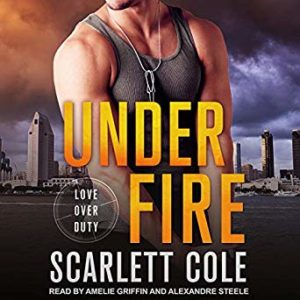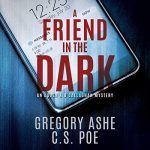Narrated by Amelie Griffin and Alexandre Steele
Scarlett Cole’s Under Fire is the first in her Love Over Duty trilogy of romantic suspense novels featuring three friends – all former military – who throw in their lots together to form a high-end private security company. The author and both narrators are new-to-me (although I think I may have heard Alexandre Steele before under a different name), so this was one of those times I took a chance because I liked the sound of the synopsis, which promised a nerdy scientist heroine teaming up with a hot former SEAL in order to prevent one of her experiments falling into the wrong hands and being developed as a chemical weapon.
Well… that is a fairly accurate outline of the plot, but what should have been an exciting, high-stakes tale full of action and danger turned out to be a bit of a yawn-fest. Neuro-scientist Louisa North is working tirelessly to find a drug that will counteract some of the more debilitating symptoms of Huntington’s disease. Her father committed suicide a decade earlier after being diagnosed with the disease, and Louisa is well aware that she has a fifty percent chance of developing it herself, but she has opted not to undergo the testing that would show if she’s carrying the gene, believing “there was no point in living under a storm cloud when she had the chance to dance in the sun.”
That’s an understandable sentiment, were it not for the fact that Louisa does not, in fact, dance in the sun, owing to the fact that she suffers from an almost crippling social anxiety and has no life outside of her work.
Anyway. In the lab one afternoon, she notices that some of her files and samples appear to have been moved – because in addition to the social anxiety, she’s a neat freak and all her materials are meticulously organised. She has to speak at a fundraiser that evening – something which, needless to say, she hates doing even as she recognises the necessity for it – and plans to alert her boss the following day to her suspicion that her research has been tampered with.
Sixton – Six – Rapp and two of his closest friends and ex-SEAL buddies have retired from the military and started their own security firm, Eagle Securities. Their first job is to provide security for a high-profile event being held to raise money for medical research, and it’s here that he meets Louisa while she’s waiting backstage – and clearly on the verge of a panic attack. They talk for a little while, Louisa gradually regains her composure and Six finds himself drawn to this obviously shy, but intelligent and determined young woman.
Louisa is unable to get the big, handsome security operative out of her head the next day, and Six, in spite of the fact that he’s never short of female company (as we’re told repeatedly) and doesn’t generally think beyond the moment where women are concerned, is unable to forget Louisa either. A chance meeting sees them talking a bit more and then going to dinner together… and when Louisa starts to become suspicious about the way her boss is acting, she confides her fears about her lab samples to Six and asks for his advice. It’s not the sort of case Eagle Securities would normally take on, and Six initially suggests she engage an investigator or she should simply go to the police… but Six is a good guy and decides he can help Louisa ‘unofficially’, even if it’s only providing the opportunity for her to talk everything through with someone. But the stakes are raised when Six arrives at Louisa’s house one evening and interrupts an attempted abduction, shooting one of her assailants in the leg and running off the other. All bets are off – Louisa needs help and Six is going to provide it – and protect her – no matter the cost.
As I said at the beginning, Under Fire had great potential, but it was largely unrealised. The pacing is really slow, the identity of the villain is obvious right from the start and I didn’t warm to either of the leads. Louisa is ‘quirky’ and odd, and I normally love a braniac heroine, but ultimately, her character was a mess of contradictions. She is pathologically shy and finds it hard to be around people, yet she gives public speeches and even does motivational speaking (albeit online); she’s quickly comfortable with Six, and, we learn, and has some (although not a lot) sexual experience – although of course, she’s never had an orgasm with a partner before Six – none of which fit with her character as described. And the constant mention of Louisa’s bangs – how she blew them out of her face, how she looked up through them – irritated me no end, and I was soon screaming at her (in my head) to get a haircut!
As for Six, he’s your generic ex-military hottie. Big, handsome, capable, he’s a goner for Louisa fairly early on, finding her quirks charming and genuinely wanting her to feel safe and secure around him. He’s got issues of his own – his reaction to loud noises on occasion suggests he may be suffering from PTSD – but apart from a couple of mentions early on and then one towards the end, it’s largely ignored. He’s a good guy, although as with Louisa’s bangs, I got a bit fed up with being constantly reminded he’d been a bit of a manwhore before he met her; and ultimately, I didn’t feel there was a great deal of chemistry between them.
With all that said, however, I suspect that some of the problems I experienced with this audiobook were related as much to the narration as to the writing. Both narrators are new-to-me and both have a handful of titles to their credit at Audible; and while neither of them was terrible, their performances didn’t do much to enhance the story. I found Alexandre Steele to be the more engaging of the two; his husky baritone was easy on the ear, his pacing was good, and he differentiated well between Six and Louisa, although I had a bit of trouble identifying the secondary characters in some of the scenes that featured Six and his buddies and had to rely on dialogue tags. One thing I did appreciate was that Mr. Steele employed different “narrative” and “character” voices, so there was never any confusion as to whether he was reading narrative or dialogue. A word of advice though – when an author writes that “X called Y’s” name in the throes of passion, you don’t really need to shout. It’s very jarring – and it made me jump! Amelie Griffin differentiates clearly between Louisa and Six as well, but her pacing was really slow, with long pauses between words and phrases that made her delivery sound unnatural. And the problem is that once you realise the narration isn’t working for you, it’s really difficult to engage with the story, which was exactly what happened for me here, and is why I really can’t recommend the audio of Under Fire.
I may try another book in the Love Over Duty series, but I think I’ll stick to print
Caz
Buy Under Fire by Scarlett Cole on Amazon




